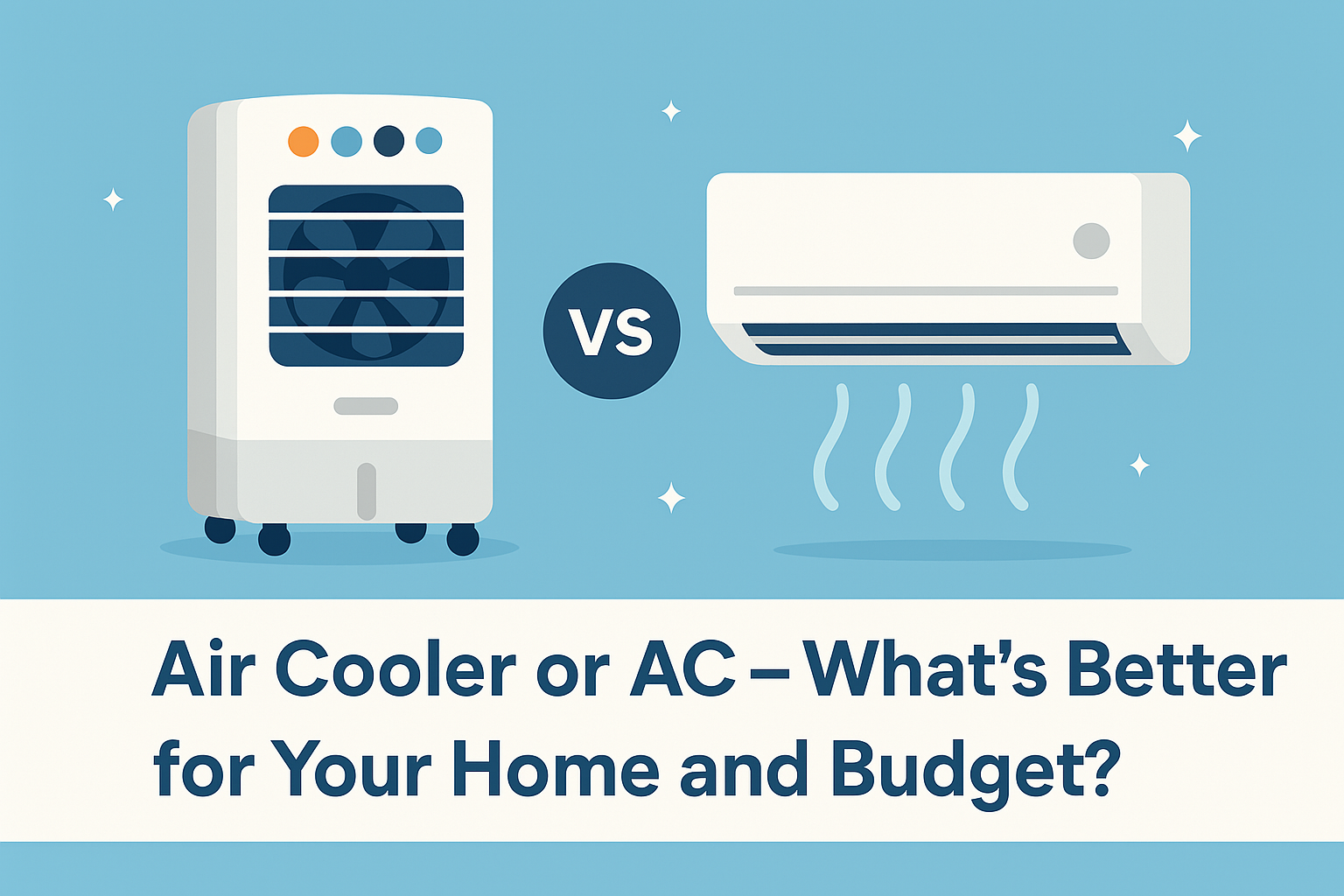As temperatures rise during the summer months, the need for an effective cooling solution becomes essential. Whether for residential or commercial spaces, choosing between an air cooler and an air conditioner (AC) can significantly impact both comfort and budget. Each option offers unique advantages and limitations, and the best choice depends on factors such as climate, room size, energy consumption, and financial considerations.
This article explores the key differences between air coolers and air conditioners to help you make an informed decision that aligns with your cooling needs and economic priorities.
Understanding the Basics
What is an Air Cooler?
An air cooler, also known as an evaporative cooler, works on the principle of water evaporation. It draws in warm air from the environment, passes it through water-saturated pads, and then blows out cooler, moistened air. Air coolers are most effective in hot and dry climates, where humidity levels are low.
What is an Air Conditioner?
An air conditioner is a closed system that uses refrigerant gases and a compressor to extract heat from indoor air and release it outside. It maintains a consistent indoor temperature by continuously cycling air through its cooling coils. ACs are suitable for all climate conditions, especially humid and coastal regions.
Cost Analysis: Initial and Long-Term
Purchase Price
- Air Coolers: Generally affordable, with prices ranging between ₹3,000 and ₹12,000, depending on brand, capacity, and features.
- Air Conditioners: Significantly more expensive, with prices starting at ₹25,000 and going up to ₹60,000 or more for high-efficiency inverter models.
Energy Consumption
- Air Coolers consume up to 80% less electricity compared to air conditioners. They are ideal for consumers looking to minimize their monthly utility bills.
- Air Conditioners, while efficient in performance, require more power. Standard AC units consume 1–2 units of electricity per hour, depending on tonnage and usage duration.
Maintenance Costs
- Air coolers require minimal maintenance — periodic cleaning of water tanks and cooling pads is usually sufficient.
- ACs involve higher maintenance costs, including regular servicing, refrigerant checks, and occasional repairs by trained technicians.
Performance and Cooling Efficiency
Cooling Capacity
- Air Coolers are effective in smaller to medium-sized rooms and work best in well-ventilated spaces. However, their cooling effectiveness drops significantly in humid conditions.
- Air Conditioners offer superior cooling performance, capable of reducing room temperature quickly and maintaining desired levels through a thermostat. They are better suited for larger rooms and closed environments.
Speed and Control
- ACs provide faster and more precise temperature control and are often equipped with features such as remote operation, programmable timers, and smart technology integration.
- Air coolers lack precise temperature control and generally provide gradual cooling without automation.
Environmental Impact
Air coolers are considered the more eco-friendly option. They do not use harmful refrigerants and operate with lower electricity consumption, contributing to a smaller carbon footprint.
Conversely, air conditioners utilize refrigerant gases that may pose environmental risks if not properly managed. Although modern ACs follow improved efficiency standards and use eco-friendly gases, they still consume significantly more power.
Usability and Convenience
Installation
- Air Coolers are typically portable and do not require any installation, making them convenient for users who may need to move them between rooms.
- Air Conditioners need professional installation, whether it is a window, split, or central system. This process may include drilling, mounting, and electrical adjustments.
Portability
- Most air coolers come with wheels and are easy to transport.
- ACs are stationary units and cannot be moved once installed.
Power Backup Compatibility
Air coolers can often operate on standard inverters or battery backups, making them suitable for regions with frequent power outages. ACs, due to their high power requirements, are generally not compatible with standard backup systems.
Indoor Air Quality
- Air Coolers circulate fresh air from outside and add moisture to the air, which can benefit dry climates. However, without proper maintenance, stagnant water in the cooler can promote the growth of bacteria or mold.
- Air Conditioners recirculate indoor air, which may become dry over time. Some advanced AC units have built-in air purifiers or dehumidifiers to improve air quality, making them a better choice for individuals with respiratory concerns.
Suitability Based on Climate
Dry and Hot Areas
Air coolers are most effective in regions with low humidity, such as northern and central India, parts of the Middle East, and dry inland zones. They cool the air naturally and provide fresh ventilation.
Humid and Coastal Regions
ACs outperform air coolers in humid climates, where evaporation-based cooling is ineffective. ACs also help reduce indoor humidity, creating a more comfortable environment.
Summary Comparison: Air Cooler vs. Air Conditioner
| Feature | Air Cooler | Air Conditioner |
| Cooling Technology | Evaporative Cooling | Refrigeration Cycle |
| Ideal Climate | Hot and Dry | All Climates |
| Energy Consumption | Low | High |
| Installation Required | No | Yes |
| Initial Cost | Low | High |
| Maintenance | Simple | Professional |
| Portability | Yes | No |
| Eco-Friendly | Yes | Partially |
| Performance in Humidity | Poor | Excellent |
| Inverter Compatibility | Yes | Rarely |
Conclusion
Choosing between an air cooler and an air conditioner depends primarily on your local climate, space requirements, energy efficiency goals, and budget constraints.
- If your priorities include lower costs, eco-friendliness, and portability, an air cooler is a suitable choice, particularly in arid regions.
- If you require high-performance cooling, humidity control, and precise temperature regulation, especially in humid environments, an air conditioner is the better option.
Before making a purchase, it is advisable to evaluate your room size, usage duration, and long-term energy costs to determine the most appropriate cooling solution for your home or office.

